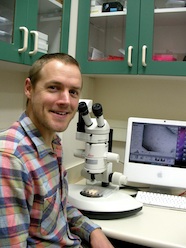Dr Peter Mace was interviewed about his experience of being awarded a University of Otago Health Sciences Postdoctoral Fellowship. These are the original interview questions and his responses.
What does your current work involve? What do you hope to achieve in this role?
Starting up an independent research lab, still working at the bench but also getting involved with some administrative tasks and supervising students/staff.
Where do you hope your career path will go from here?
Hopefully towards a permanent position heading up a research group, be it in a lectureship or research only role or with teaching.
What attracted you to this field of work? Were there specific people that were an influence on your choices?
Basic interest really, good undergraduate lecturers and wanting to find out how things work, with an overall goal of understanding disease to help people in the big picture.
What excites you about it?
The constant challenge and excitement of making new discoveries about biology that you are the first person to know about, ever. Also the potential that discoveries I make about basic disease processes could help medical outcomes of patients, be it through directly finding out about a proteins mechanism of action or just helping another group see a drug target in a particular way. Also that I enjoy that my day-to-day research is pretty varied from wet work right though to modelling, so that keeps things interesting.
What role did receiving a postdoctoral fellowship have on your career path up to this point?
My Health Sciences Postdoctoral Fellowship was vital to giving me a chance to bolster my publication record, which then allowed me to get a second postdoc in a really good lab in the USA. The additional papers/awards I had on my CV from the HSPF [Health Sciences Postdoctoral Fellowship] subsequently allowed me to be competitive for a postdoc fellowship in the USA right from the start. With only the papers from my PhD I would have had a much tougher time getting a US fellowship, as I would have been compared to US PhD students who spend 5-6 years during PhD accumulating papers compared to 3-4 in NZ.
What were the most valuable things that the opportunity provided you with?
Time to be really productive in a good lab. So much of the PhD is spent just learning the ropes, it was really valuable to then go and apply this in a new area of research. When you know what you are doing technically following PhD training you can achieve so much more in a short period of time, and think about the bigger research questions more.
What types of impact did this opportunity have on your research direction and prospects?
It allowed me to change fields slightly and apply the technical skills that I had learnt in my PhD to a new area with broader scope.
What things did it enable you to do that you wouldn't otherwise have been able to do?
It really had a snowball effect by giving me a really productive patch, which then let me go overseas with success and confidence under my belt. This meant my postdoc overseas was more productive and hence I could get a fellowship to come back to NZ.
Were there contacts, connections, networks, that were opened up to you?
Absolutely, firstly I moved into the field and met contacts that led to my US postdoc, and have pretty strong links still there, as well as back at Otago.
Were there any downsides, sacrifices or difficult choices to make?
Not really. Probably the biggest choice was after doing a PhD and a postdoc in Dunedin to make sure I did not settle down too much and pushed myself to get overseas and broaden my horizons. In hindsight this was invaluable to get away for overseas experience and new ways to approach things.
What advice would you give to someone aspiring to postdoc work?
Not to aspire to do postdoc work per se, use the postdoctoral period to set them up for whatever they want to do next. It is a good juncture to critically assess your future direction and shape your postdoctoral experience towards that.
Where did you grow up? What interested you in the world as a child?
Grew up in Tokoroa, I could find most things interesting to be honest once you start to get into it.
Did you have a clear vision as a child of what you would like to be doing as a career?
Not very quotable, but not really!
What subjects did you enjoy most at school, and as an undergraduate?
Enjoyed most subjects I took at school, science, maths history geography, bit of economics. Undergrad started getting intrigued by biochem and wound up following that path.
Why did you choose Otago, or the group you worked with, for your post doc?
I initially chose Otago to come to med school, pretty early in second year med (ie before term really started) I realised it was not quite for me and I was more interested in the basic biology underlying human health.
Did it prove to be a good decision? If so, why? If not, why not?
Maybe the career path may have been a bit more clear and certain had I stayed in med school but no regrets!
What do you enjoy doing outside of your work?
Family, hiking, music, golf.
Is there anything else you'd like to add?
My Health Science Fellowship was basically a catalyst to kick start my research career. A great opportunity just when I started really knowing my way around the lab and how to put together a project, so I think a vital scheme for both individuals careers and strengthening research at Otago.

Dr Peter Mace in the lab.
Related links
- Health Sciences Postdoctoral Fellowship profile: Dr Peter Mace
-
Dr Peter Mace research profile
Department of Biochemistry
